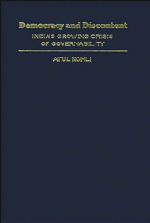Book contents
- Frontmatter
- Contents
- List of tables and figures
- Preface and acknowledgments
- PART I INTRODUCTION
- PART II THE GROWING PROBLEMS OF GOVERNING THE PERIPHERY: POLITICS IN THE DISTRICTS
- Introduction: the districts
- 3 Kheda, Gujarat
- 4 Guntur, Andhra Pradesh
- 5 Belgaun, Karnataka
- 6 Calcutta, West Bengal
- 7 Madurai, Tamil Nadu
- Conclusion: the districts
- PART III ORDER AND BREAKDOWN IN THE STATES
- PART IV CENTRALIZATION AND POWERLESSNESS AT THE CENTER
- PART V FINAL INFERENCES
- Bibliography
- Index
Conclusion: the districts
Published online by Cambridge University Press: 05 June 2012
- Frontmatter
- Contents
- List of tables and figures
- Preface and acknowledgments
- PART I INTRODUCTION
- PART II THE GROWING PROBLEMS OF GOVERNING THE PERIPHERY: POLITICS IN THE DISTRICTS
- Introduction: the districts
- 3 Kheda, Gujarat
- 4 Guntur, Andhra Pradesh
- 5 Belgaun, Karnataka
- 6 Calcutta, West Bengal
- 7 Madurai, Tamil Nadu
- Conclusion: the districts
- PART III ORDER AND BREAKDOWN IN THE STATES
- PART IV CENTRALIZATION AND POWERLESSNESS AT THE CENTER
- PART V FINAL INFERENCES
- Bibliography
- Index
Summary
In this Part II (Chapters 3–7), an attempt has been made to describe and to explain political changes in five districts in India over the past 25 years. It is now time to pull together some of the common themes running through the changes in these districts so as to reach a few tentative conclusions concerning the kinds of political trends that have replaced the “Congress system” at India's political periphery and to identify the forces that have influenced the rates and patterns of political change.
Before addressing these core issues, an important caveat should be noted concerning the issue of how well these five districts represent India's political periphery. Given India's diversity, it is clear that no five districts, and therefore no microcosm, can capture all nuances and regional variations. Nevertheless, Weiner selected these five districts in the early 1960s in consultation with the leaders of the Congress party. At that time, these districts were deemed to represent areas of Congress strength and to give a good cross section of India's diversity. Thus, they were well suited for examining the issue of how and why Congress had succeeded in India. Some 25 years later, it is not unreasonable to hold that a study of the same five districts should have something to contribute to our understanding of the changing nature of the Congress party and the changing patterns of India's local politics.
- Type
- Chapter
- Information
- Democracy and DiscontentIndia's Growing Crisis of Governability, pp. 184 - 200Publisher: Cambridge University PressPrint publication year: 1991



